- Home
- Melissa Walker
Dust to Dust
Dust to Dust Read online
Dedication
For Barbara Walker, my favorite niece
Contents
Dedication
One
Two
Three
Four
Five
Six
Seven
Eight
Nine
Ten
Eleven
Twelve
Thirteen
Fourteen
Fifteen
Sixteen
Seventeen
Eighteen
Nineteen
Twenty
Twenty-one
Twenty-two
Twenty-three
Twenty-four
Twenty-five
Epilogue
Acknowledgments
Back Ads
About the Author
Books by Melissa Walker
Credits
Copyright
About the Publisher
One
MY FATHER SAYS THAT people in comas experience all kinds of visions—neurons fire, new pathways open in the brain. I don’t know the science behind all that, but I’ve been concentrating very hard on staying in the present, and only seeing the things that are right before my eyes. Now that I’m finally at home, that’s getting easier.
The wooden swing on our wraparound porch goes back and forth, back and forth without a creak. To the left, I see our manicured front lawn, all flush with emerald-green grass and violet larkspurs, and to the right there’s the bend in the Ashley River that has always been my backyard. My father installed this swing with his perfectionist’s touch, and I know he did it just for me. I can picture him out here toiling with hammer and nails in the hot July sun. He kept his mind on solid wood and hard work instead of me, his only daughter, lying comatose in the hospital.
As my toe touches the ground to keep the swing moving, I wince at the sight of the long, jagged scar on my leg. My meds are wearing off and I’m starting to feel that familiar tingle that signals the edge of pain throughout my body. I take a white pill from the pocket of my shorts and place it under my tongue before swallowing it with a sip of lemonade.
I’ve been home from the county hospital for two weeks, and I’ve spent most of that time in this porch swing, surrounded by yellow-and-white-striped pillows. There’s something about this swing, its motion, that’s familiar. Like I’m being held and rocked by something. Or someone.
I remember his soft blond hair, the way it curled around his ears. I remember the blue of his eyes, the tiny scar on his chin. I remember the way his gaze never wandered from mine, the slightly crooked smile.
Shaking my head, I clear the “memories” that I’ve created in some deep, coma-induced fiction-loving part of my brain.
I look down at the white-painted planks of my porch. What I should focus on is all the living I have to do, the little things that make life worth missing. Like the gentle relief of the wind that touches my skin as the ceiling fan turns the hot Charleston air, the sound of sprinklers in our yard as Dad tries to keep the grass from browning in this sweltering heat, the slow rumble of Mrs. Nute’s car as she drives by and gives me a wave and a thumbs-up.
I smile and wave back, my arm completely healed from its break.
Everyone’s giving me a thumbs-up these days. Callie McPhee, the girl who came back from the dead.
Except I wasn’t dead.
When I crashed my shiny new BMW into a truck on Route 52 in June, I almost lost my life. What I understand is that I was in a coma, alive but unresponsive for weeks. That gave my body time to heal.
I get what happened to my body. It’s what happened in my head that I can’t understand.
I think my synapses worked overtime, because I remember so many things: the sound of his voice, like velvet; the shadow of stubble around his chin; the way one blond lock of hair fell onto his forehead when he leaned close to me. And his name: Thatcher.
He was my ally. He protected me, kept me from something dark and sinister that I can’t quite place. The world I was in, the Prism, wasn’t all light and happiness—it wasn’t Heaven—but the moments with Thatcher . . . they were. I have the urge to call for him, to lean my face into the sun and search for him in the invisible heat of summer.
I turn my head toward the river and watch its placid surface shimmer in the sunlight. I took the pill but I still feel some phantom sensations inside my body, echoes of the brokenness, I guess. I wonder if I’ll ever feel whole again.
A Carolina wren lands on the porch railing in front of me and looks into my face, cocking its head. For a moment it seems like its eyes, deep and blue and familiar, are trying to tell me something, like they know me.
“Thatcher?” I whisper.
The bird flies away quickly, up into a tree and out of view.
I lean back against the back of the swing and laugh. What am I doing? Talking to a bird? Imagining that it’s this ghost boy who doesn’t even exist?
“Callie? Can I bring you a blanket?”
My father’s voice booms from the front door, which he’s opened up a crack.
“Daddy, it’s like one hundred degrees,” I say. “Do you think I’m one of those crazy old ladies who needs a blanket no matter what?”
He smiles. “I just thought that with the fan on—”
“With the fan on it’s almost bearable out here,” I tell him. Then I tap the swing. “Come sit.”
He does.
We’re silent for a couple of minutes, and I can feel him tensing up. My retired-navy father, who never used to have time for anything impromptu, who lived his life with military precision and a schedule that was as airtight as a submarine, is having trouble sitting without looking at his watch.
“Pretty day,” I say, hoping to help him relax.
“Gorgeous. Makes you appreciate things.” He looks at me then, and I know what he means by “things.” Being alive, being together. He may not be able to express it quite yet, but I can tell that he’s trying to do things differently now that his daughter has faced death.
He took the week off from his job at the Citadel. He teaches physical science during the year, and he usually goes into the office all summer—research and writing and all that professorial stuff. Since I’ve been home from the hospital, though, he’s been hovering, tending to my needs (both real and imagined, like the blanket).
“How’re you feeling?” he asks.
“Good,” I say, patting my pocket. “Just took a pill.”
“Still having visions?”
My face goes red at the mortifying thought of my stoic father seeing me talk to a bird. When I was in the hospital and kind of out of it, I told him that I’d seen another world called the Prism. I wish I hadn’t, but he doesn’t seem to judge me for it. He, of all people, knows it was just the pain meds talking.
“Less and less,” I tell him. The truth is that when I take a pill, I feel more at ease, and not just physically. My mind relaxes, too. The Prism is a lovely name for a place that doesn’t exist. And Thatcher? He’s not real.
But the guy pulling into my driveway is.
“Hey, hey.” Nick gets out of his beat-up sedan and strides up to the porch with a bouquet of sunflowers under his arm. My dad stands up to shake his hand.
“Captain McPhee,” says Nick with a nod.
“Mr. Fisher.”
Relations between my father and my boyfriend used to be chilly, but since the accident there’s been a slight thaw. Before, my dad wanted a lot of things for me: a perfect GPA, the right college, a proper career path. Of course, he still wants those things, but first and foremost, he wants me to be happy.
And when I can shake the visions from my head, I am.
I look into Nick’s soulful brown eyes as he
bends down to hand over the flowers and give me a kiss on the cheek, and I can’t help but feel like a lucky girl. The pill is working—my soreness is gone for the moment.
“Ahem.” Dad coughs into his fist.
Nick’s face reddens and he looks at me, his eyes a little panicky. I realize he’s wondering if my dad found out that he’s been sneaking into my room at night through the upstairs window.
“Daddy, hush,” I say, swatting his arm playfully. “Don’t embarrass Nick.”
I give Nick a smile to let him know that our secret is safe, and he visibly exhales. Dad stares at him for a moment. My father may be attempting to show a softer side to me since the accident, but he’s still Captain McPhee with everyone else.
When I start to stand, both Dad and Nick put their hands out to help steady me, but I shoo them away.
“Y’all, I’m not an invalid,” I say, though I do need to hold on to the porch rail to get up. I’ve been doing physical therapy every day and I feel stronger and stronger—I can see muscle tone returning to my legs, and the therapist said it’s good for me to walk around and stand on my own. What I really want is for everyone to back off and treat me normally.
“Nick, do you want a lemonade?” I ask, stepping slowly toward the front door.
“I’ll get it,” he says, but I push my hand into the center of his chest in a Stop motion. As an added bonus, I get to touch his tight muscles.
“No, I will get it,” I tell him with a flirty grin. Then I turn my head. “Daddy?”
My father is looking at me like I’m a withered flower that’s been crushed under a cow’s foot. “Let me, honey,” he says.
“Good gracious, will everyone just relax?” I say, shaking the sunflowers at them for emphasis. “I am capable of pouring two glasses of lemonade.”
“Make that three, Callie!” says a bright voice from behind me. I turn to see Carson, my neighbor and best friend, making her way up the porch steps with a big picnic basket under her arm.
She raises her heart-shaped sunglasses onto her head and winks at me. I give her a grateful smile—Carson is the only one who treats me like I’m an able-bodied person these days. She grabs the sunflowers from me and says, “Hurry up now! The potato salad’s getting warm.”
As I set up the tray with three glasses, ice, and a pitcher of lemonade, I feel extra glad that I haven’t told Carson about my visions. Not because she’d think I was nuts, but because she’d want to hear every single detail. Carson’s really into “the other side” and all of Charleston’s ghost lore. She’s been dying for me to remember things about when I was in the coma, but I’ve told her it’s all a blank. I feel bad lying to my best friend, but I don’t want to make the illusions I created in my head feel more real by discussing them with Carson. Only my dad knows, and he’s already dismissed everything as coma-induced brain misfires. Just like I have. Mostly.
I carry out the tray and exit through the back door to meet Carson at the wooden table by the water. Our housekeeper, Carla, comes three times a week, and she set up the patio umbrella this morning when I told her we were going to have a picnic tonight. It’ll guard us from the evening sun, and I swear it’s ten degrees cooler in the shade. Carson is setting up the deviled eggs, and she already has Nick’s flowers in a mason jar she brought with her and filled with river water.
She smiles at me. “I got another call from that Good Morning Charleston producer.”
I glare at her. “Carson, I already told her no.”
“Oh, but Callie, it would be so much fun!” She looks at the sky and her face lights up in the way that tells me she’s about to rush down a talking highway at full speed. “They said they’d send a car to take us to the studio! And you wouldn’t have to make up anything—if you don’t remember what it was like to be in the coma, you can just say that. The producer said that everyone just wants to see you, the girl who almost died. People are really interested in these kind of stories, you know. And maybe you’ll even remember something if they ask the right questions and—”
I’ve been giving her a no face this whole time, and she finally pauses. “Cars, I don’t want to sit on a couch and smile for the cameras. What happened to me is personal.”
She gives me a sad smile, and I can’t tell if she’s accepting what I’m saying. I hope so. I mean it. The truth is, I don’t understand my time in the coma, and I certainly don’t want to try to figure it out on television.
“All right,” sighs Carson. “I give up . . . for now.” Then she glances up at the house. “So things are okay with your dad and Nick?”
I turn back to the porch to see my father showing Nick the remote control he uses to turn the sprinklers on and off. Dad is frowning in concentration and Nick’s face is slightly red.
“It’s still awkward, but I think they’re both trying,” I say, happy to change the subject.
“It’s cute to watch them together,” says Carson, smiling at their stiffness. We break up into laughter and then she gestures at her table. “So what do you think?”
Carson’s setting is total Martha Stewart—white tablecloth, Nick’s flowers, a tiny votive candle in the center of the table, and sturdy paper plates filled with cole slaw, potato salad, and cold fried chicken. “Wouldn’t I make a great girlfriend?” asks Carson, throwing back her glossy brown curls and laughing as she waves Nick and my dad over to dinner. “How did you end up with the perfect guy while I’m still as solitary as ten miles of bad road?”
I grin at her. “Just lucky, I guess.” But as I watch Nick walk across the grass toward me, I feel uneasy, like I’m forgetting something that’s between us . . . or someone. The phantom pain echoes inside me again and I fish in my pocket for another pill—I have one more left in today’s dosage and I’d better save it for bedtime.
When we all grasp hands to say the prayer, my dad bows his head as we close our eyes.
“Thanks be to God for this table, this food, and the friends who are sharing it. Our eternal gratitude for Callie’s second chance at life, Carson’s loyal friendship, and Nick’s pure love of our girl.”
Carson squeezes my hand and I almost giggle and break the silence—embarrassing!—but when I open my eyes, Nick is smiling at me. It’s a nice moment, one I can’t imagine having had at the beginning of the summer, when my dad was telling me I was too young for a boyfriend. Back then he hardly ever made time for a sit-down meal; I fended for myself at night with leftovers that our housekeeper tucked into the fridge while he got home past dinnertime, and our conversations consisted mostly of him setting boundaries and me nodding dutifully with my fingers crossed behind my back.
Before the crash, I looked for this sense of contentment in all the wrong places—in the rush of wind as I drove too fast, in the free-fall sensation of jumping off a too-high cliff into a swimming hole. I put myself in danger just so I could feel something. I used to need a thrill to feel alive, but now this will do.
It’s a whole new world since I almost died, and everyone I love is sitting around this table.
Well, almost everyone.
Two
WHEN I SAY GOOD-BYE to Nick and Carson after a full meal and a “Happy Recovery, Callie!” cake, complete with rose piping and near-perfect pink script (Carson’s practicing her frosting skills), Nick whispers in my ear, “See you later.”
This is the first night that I insist my father not help me up the stairs to my room—I’m ready to live my life again, on my own, and it only takes a little bit longer than usual for me to navigate the steps. He’s still there with a glass of water, though, to tuck me into bed and give me a kiss on my forehead.
“Daddy,” I say, when he stands up to leave my room. “You know I’m not eight years old, right?”
His eyes crinkle up around the edges for a moment, and I wonder if he’s getting emotional, but then he clears his throat. “Yes,” he says. “Believe me. I know I missed that time.”
He’s not wrong to have regrets about the way he walled off his grief an
d stopped connecting with the world, including me, after Mama died when I was six years old. He did miss a lot.
“Well . . . good night,” he says. And it’s just a word, but the way he says it is softer than usual, like he’s trying to convey something deeper. I smile at him in the doorway, hoping he can tell that I appreciate his efforts to show me his affection.
As my father’s footsteps echo down the hallway, though, loneliness creeps in. Looking around my room, at the wide window seat, the soft yellow curtains, the photos on my antique-looking desk, something is . . . out of place. A flash, a memory, races through my brain—I’m in this room, but it’s not real. It shimmers, just out of reach. I can’t touch anything; there’s nothing solid. I’m not solid.
But he was. Thatcher. He moved at my side like an opposing magnet, never quite touching me but always close, always watching, always protecting me from . . . what?
I’ve been having nightmares since the accident. Just this morning I woke up with a jolt, and a lingering image of my bedroom—this very room—ransacked and destroyed, its contents scattered and broken as if a tornado had ripped through it. And I remember a voice, his voice, telling me to be careful, to stay alert. In the journal next to my bed, I wrote down Thatcher’s words so I wouldn’t forget them. I’m almost afraid to look at them now, but when I open the page, I see my own shaky handwriting and I can hear him saying, “I’ll find them. I’ll protect you.”
I grab a pen quickly and scribble out the words. They’re nonsense. They’re the fog my dad was talking about, the haze of the pills and the misfired synapses in my post-coma brain. But it’s strange to me that it’s only in the early morning, when my pill is wearing off, that these visions and voices—these nightmares—come.
A small bead of dread settles into my stomach, so I close the journal and put it back in its place underneath the books in my nightstand’s top drawer. Then I quietly lift up my comforter to step onto the floor. The feeling of the soft tufted rug under my feet does a little to ease my worries and ground me back in my world. This is real. I am here.
So why, for a moment, did it seem like I was somewhere far away?

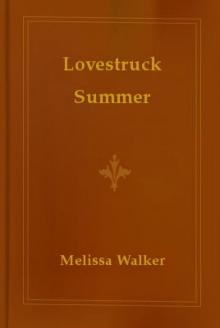 Lovestruck Summer
Lovestruck Summer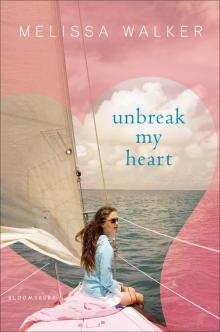 Unbreak My Heart
Unbreak My Heart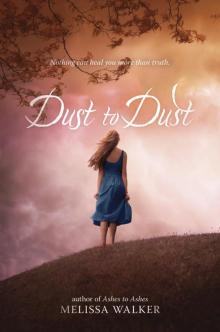 Dust to Dust
Dust to Dust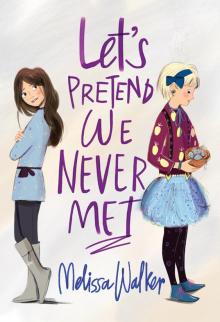 Let's Pretend We Never Met
Let's Pretend We Never Met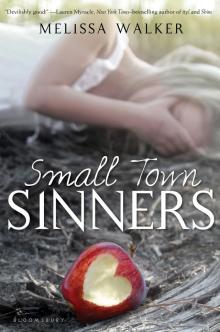 Small Town Sinners
Small Town Sinners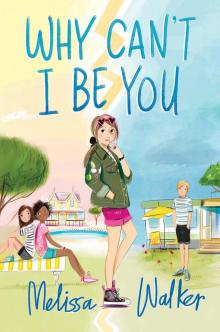 Why Can't I Be You
Why Can't I Be You